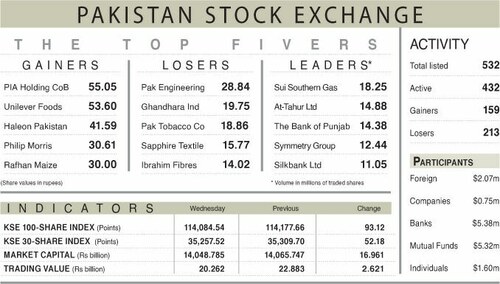KARACHI: The State Bank of Pakistan (SBP) said on Monday it expects the economy to grow in the range of 2-3 per cent in 2023-24.
According to the annual report for the fiscal year ending on June 30, the lagged impact of monetary tightening and other contractionary measures are expected to keep domestic demand in check going forward.
Inflation is likely to decelerate in the range of 20-22pc in 2023-24 because of the prospects of improvement in the supply situation. There’s a likely increase in the production of important crops and imports. In addition, slightly improved global and domestic growth prospects are expected to bolster foreign exchange earnings from exports of goods and services.
Although import volumes are likely to increase, lower commodity prices may prevent a significant expansion in the import bill in 2023-24, the SBP said.
The report highlights that Pakistan’s economic situation has started to show some early signs of improvement. The country was able to secure a $3 billion Stand-By Arrangement (SBA) from the International Monetary Fund (IMF) towards the end of 2022-23, which helped in alleviating near-term risks to the external sector. The high-frequency indicators are suggesting the bottoming out of economic activity from July 2023. The withdrawal of guidance on import prioritisation, alongside gradual ease in the foreign exchange position, is expected to somewhat ameliorate the supply-chain situation and lift growth in large-scale manufacturing (LSM) as well as exports. Moreover, an expected rebound in cotton and rice production will support agriculture growth in 2023-24, the SBP said.
The report said that Pakistan’s economic performance in 2022-23 highlights the importance of addressing “perennial structural impediments” that pose serious risks to macroeconomic stability. Foremost among these are inadequate and slow tax policy reforms that have constricted the resource envelope, even for meeting current expenditures. On the other hand, inefficiencies in public-sector enterprises (PSEs) have led to a permanent drain on fiscal resources.
These have squeezed space for development spending required to enhance the economy’s productive capacity. The anaemic investment in physical and human capital as well as research and development has impeded the development of a technology-intensive manufacturing base and next-level value-added exports.
Moreover, stagnant crop yields and a lack of attention to the development of the food supply chain, and to address food market imperfections, have led to sustained reliance on imported food commodities. These trends underpin the unsustainable current account balance, which has increased the country’s vulnerability to global supply shocks.
The report indicates that this situation requires the initiation of broad-ranging reforms to address various sectoral imbalances to ensure the availability of resources for economic growth and development. Specifically, expediting tax policy reforms and the speedy implementation of governance reforms in PSEs are instrumental in the creation of fiscal space for public investment in human and physical capital.
Furthermore, there is also a need to create a conducive environment to support foreign direct investment in exportable sectors, and to encourage technology transfers. Similarly, agriculture-sector reforms are required to alleviate import reliance and achieve price stability. There is a need to expedite these reforms to achieve the high and sustainable economic growth required to absorb the new entrants in the labour market, improve social welfare and raise the general standard of living, the SBP said.
The SBP noted that the macroeconomic situation had already begun to deteriorate since the second half of 2021-22 in the aftermath of the Russian-Ukraine conflict, elevated global commodity prices and an unplanned fiscal expansion.
Published in Dawn, October 24th, 2023














































